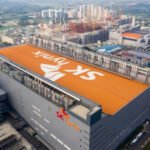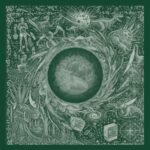Ascend Elements employees load lithium-ion EV batteries onto a conveyor belt at the company’s battery recycling facility in Covington, Georgia (Courtesy of Ascend Elements)
SK Ecoplant Co., a South Korean construction engineering and waste management company under SK Group, has unloaded its stakes in US-based lithium-ion battery recycling firm Ascend Elements Inc. for about $98 million as part of its restructuring in tandem with its parent’s broad business reorganization.
The Korean company announced on Monday that it sold off its entire holdings of over 9.2 million shares in Ascend Elements to Seoul-based private equity firm SKS Private Equity.
It was the largest stakeholder of the US battery recycling startup with a seat on its board of directors after investing $60.84 million – $50 million in August 2022 and $10.84 million in April 2023.
Founded in 2015, Ascend Elements is a recycling specialist that uses advanced particle engineering techniques to transform used lithium-ion batteries and scrap into highly engineered precursors and cathode active materials.
Following the stake sale, SK Ecoplant has recouped $98.23 million, more than its total investment that is expected to be used to shore up its financial health and speed up the restructuring of its electronic waste (e-waste) business.
As part of the business reorganization, the company plans to foster the IT asset disposition (ITAD) business led by its subsidiary SK Tes, formerly TES Envirocorp Pte. (TES) acquired by SK Ecoplant in February 2022.
It will also seek new battery recycling businesses in North America while accelerating its advance into the global waste battery recycling business through its facilities in Europe and Asia.
HIGH HOPES ON ITAD BUSINESS
SK Tes has been actively expanding ITAD infrastructure that deals with growing e-waste from data centers amid an artificial intelligence boom.
ITAD services focus on reusing, recycling, repurposing, repairing or disposing of unwanted IT equipment in a safe and environmentally responsible way. ITAD companies delete data from IT devices, dispose used hardware, such as desktops, laptops, servers, phones and tablets, and recycle them.
SK Tes runs a factory in Virginia, the US, that can process 600,000 server units every year. At the factory, data in server hard disc drives and memories are completely wiped so they can be reused or recycled.
SK Tes ITAD facility in Las Vegas (Courtesy of SK Ecoplant)
SK Tes also offers other e-waste and battery recycling, onsite data destruction, data center services and energy storage system services at its 43 plants in 21 countries, with major facilities in Singapore, China, Australia, the UK and Germany.
These services align well with SK Ecoplant’s plan to unlock business opportunities in the AI data center construction business.
Its ITAD service is also expected to create great synergy with Essencore Ltd., a consumer memory and storage maker that will be transferred to SK Ecoplant from SK Inc., SK Group’s holding company.
Hong Kong-headquartered Essencore manufactures SD cards and USB flash drives with DRAM and NAND flash memory chips produced by SK Hynix Inc. These parts can be installed in recycled and repurposed electronic devices and IT equipment by SK Tes.
The two companies are also expected to cooperate on a business to extract valuable metals from used semiconductors and resell them to chip makers.
EXPANSION OF GLOBAL FOOTPRINT IN BATTERY RECYCLING
Although it has sold off its stakes in Ascend Elements, SK Ecoplant will continue to expand its battery recycling business across the world.
SK Ecoplant CEO Park Kyung-il (left) and Ascend Elements CEO Mike O’Kronley agree to build a US battery recycling joint venture in Kentucky (Courtesy of SK Ecoplant)
It will actively leverage its battery recycling infrastructure in North America to discover new growth opportunities.
In September last year, SK Ecoplant agreed with Ascend Elements and SK Tes to build a $65.8 million battery recycling joint venture in Hopkinsville, Kentucky.
The Korean company has also acquired technologies to improve the recovery rate of precious metals such as nickel, cobalt or lithium from spent lithium-ion batteries.
SK Ecoplant plans to continue to enhance its competitiveness in the e-waste recycling business, including spent lithium-ion batteries, to expand its footing in the global market.
The company has been reorganizing its business portfolio as part of its parent SK Group’s aggressive restructuring to focus on mainstay growth engines, such as semiconductors and batteries.
Korea’s second-largest conglomerate hopes to revive sluggish units like SK On Co., the world’s No. 5 EV battery market and SK Ecoplant through the ongoing restructuring.
Once the business reorganization is completed, SK Ecoplant is expected to be one of the group’s three core businesses along with SK Hynix and SK Telecom Co. for the group’s AI vision.
By Jun-Ho Cha
chacha@hankyung.com
Sookyung Seo edited this article.















